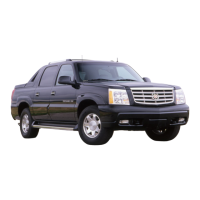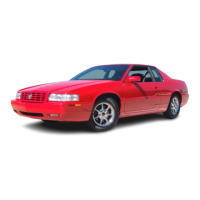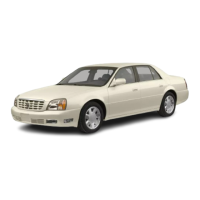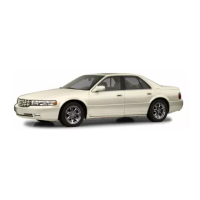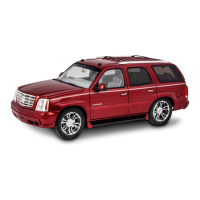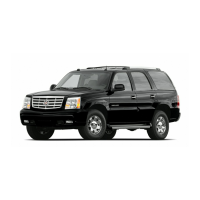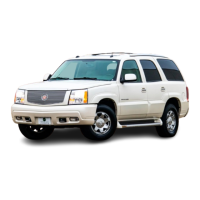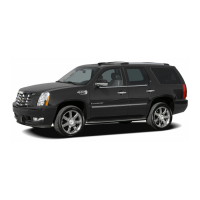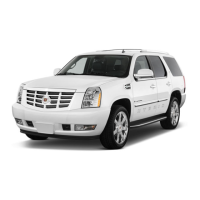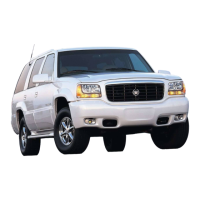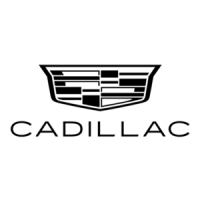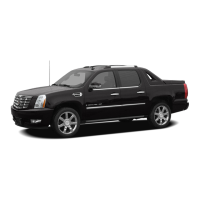Do you have a question about the Cadillac 2002 Escalade and is the answer not in the manual?
Adjusting front seats, including power seat functions, lumbar, and memory features.
Guidelines for proper safety belt usage for adults and children.
Explanation of frontal and side impact airbags and their function.
Overview of various child restraint types: infant car beds, rear-facing, forward-facing seats, and boosters.
Recommendations on placing child restraints safely, especially avoiding front passenger seat.
Details on operating power windows, express-down, and window lockout features.
Explanation of manual and power door locking mechanisms for security.
How to use the remote keyless entry transmitter for locking/unlocking doors and liftgate.
Instructions on how to start the engine safely, including cold weather tips.
Explanation of shift lever positions (Park, Reverse, Neutral, Drive, etc.) and their functions.
Information on using cruise control, including safety precautions and setting speed.
Overview of the instrument panel components and their functions.
Operating the electronic climate control system: fan, temperature, and mode controls.
How to use the air conditioning system for cooling and dehumidifying the interior.
Using the heater effectively, including cold weather tips and engine coolant heater.
Overview of the audio system, including radio, cassette, and CD changer operation.
Activating and deactivating the THEFTLOCK system for radio security.
Key principles of defensive driving, including anticipating hazards and maintaining space.
Information on alcohol's effects on driving ability and BAC levels.
Explanation of braking action, reaction time, stopping distances, and ABS.
How the TCS limits wheel spin in slippery conditions and its operation.
Function of Stabilitrak for maintaining directional control in difficult conditions.
Precautions for driving on wet surfaces, including hydroplaning and brake care.
Essential information for safely towing trailers, including equipment and driving tips.
Safe procedures for jump starting a vehicle using jumper cables.
What to do if the engine overheats, including operating modes and warnings.
What to expect and do if a tire blows out or leaks air.
Step-by-step instructions for safely changing a flat tire using the jack and tools.
Recommendations for getting service done by dealers and using genuine GM parts.
Information on gasoline octane requirements and specifications for optimal performance.
Safe procedures for refueling the vehicle and handling the fuel cap.
How to check engine oil level and when to add oil.
Guidance on selecting the correct engine oil viscosity and API certification.
Understanding the GM Oil Life System and when to perform oil and filter changes.
When to check and change automatic transmission fluid and filter.
Information on the cooling system, coolant type, and adding coolant.
Information on brake fluid, checking levels, and brake wear warnings.
Information on tire maintenance, including pressure, wear, and selection.
How to check and maintain correct tire inflation pressure for safety and performance.
When and how to replace wheels, bolts, and nuts, emphasizing correct parts.
How fuses and circuit breakers protect the vehicle's electrical system.
Technical data for engine, wheels, tires, cooling system, and fuel tank capacity.
Details on services and intervals for maintaining the vehicle's condition.
Owner-performed checks and services at various intervals for vehicle upkeep.
Inspections recommended for dealer service or qualified centers at regular intervals.
List of recommended fluids and lubricants by usage and part number.
Steps to resolve concerns with dealerships and Cadillac Customer Assistance.
Contact information for Cadillac Customer Assistance Centers in US, Canada, and overseas.
Overview of Cadillac's Roadside Service benefits and on-site assistance.
How to report vehicle safety defects to NHTSA and contact information.
How to report vehicle safety defects directly to General Motors.
| Brand | Cadillac |
|---|---|
| Model | 2002 Escalade |
| Category | Automobile |
| Language | English |
